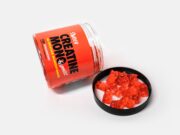Menopause is a natural part of the aging process for women, marked by the end of menstrual periods and the decline in estrogen and other hormones. While menopause can bring a range of physical and emotional symptoms, there are a number of menopause supplements that can help alleviate these symptoms and support overall health during this transition. Here are 5 supplements that every woman should consider during menopause:
Calcium and Vitamin D: As estrogen levels decline during menopause, women may be at increased risk for osteoporosis, a condition that weakens bones and makes them more prone to fractures. Calcium and vitamin D are essential for maintaining strong bones and reducing the risk of osteoporosis. Aim for at least 1000 mg of calcium per day and 600-800 IU of vitamin D.
Black Cohosh: Black cohosh is a herb that has been traditionally used to treat menopausal symptoms such as hot flashes, night sweats, and mood changes. Some studies have shown that it can be effective in reducing the frequency and severity of these symptoms.
Red Clover: Red clover is another herb that has been used to treat menopause symptoms, including hot flashes and night sweats. It is also a rich source of isoflavones, plant compounds that act like estrogen in the body and may help with menopause symptoms.
Probiotics: Probiotics are beneficial bacteria that live in the gut and help with digestion and immune function. Some research suggests that probiotics may also be helpful in reducing menopause symptoms such as hot flashes and mood changes.
Omega-3 Fatty Acids: Omega-3 fatty acids are essential for maintaining overall health and have been shown to have a number of benefits, including reducing inflammation and improving heart health. They may also help with menopause symptoms such as mood changes and hot flashes. Aim for at least two servings of fatty fish per week or consider taking an omega-3 supplement.
It’s important to note that supplements are not a replacement for a healthy diet and lifestyle. Be sure to talk to your healthcare provider before starting any new supplement regimen, as some supplements can interact with medications or have other potential risks.
In addition to the above supplements, there are a few others that may be worth considering during menopause. For example:
B vitamins: B vitamins, particularly B6 and folic acid, may help with mood changes and depression during menopause.
Vitamin E: Some studies have suggested that vitamin E may be helpful in reducing hot flashes and other menopause symptoms.
Melatonin: Melatonin is a hormone involved in sleep regulation, and some research suggests that it may be helpful in improving sleep quality during menopause.
Herbal teas: Certain herbs, such as chamomile, valerian, and passionflower, have been traditionally used to promote relaxation and improve sleep. Sipping on herbal teas containing these herbs may be a natural way to help with sleep issues during menopause.
Lastly, be sure to choose high-quality supplements from reputable sources, as the quality and purity of supplements can vary widely.























